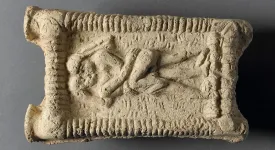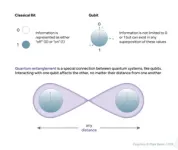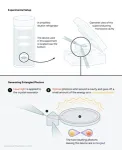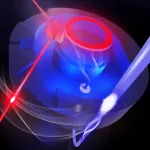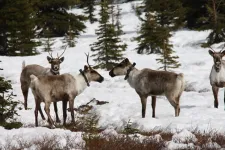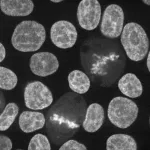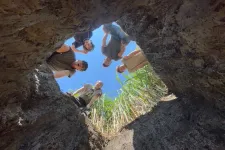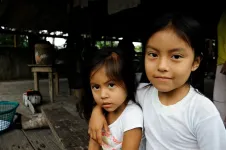(Press-News.org) Recent research has hypothesised that the earliest evidence of human lip kissing originated in a very specific geographical location in South Asia 3,500 years ago, from where it may have spread to other regions, simultaneously accelerating the spread of the herpes simplex virus 1.
But according to Dr Troels Pank Arbøll and Dr Sophie Lund Rasmussen, who in a new article in the journal Science draw on a range of written sources from the earliest Mesopotamian societies, kissing was already a well-established practice 4,500 years ago in the Middle East. And probably much earlier, moving the earliest documentation for kissing back 1,000 years compared to what was previously acknowledged in the scientific community.
“In ancient Mesopotamia, which is the name for the early human cultures that existed between the Euphrates and Tigris rivers in present-day Iraq and Syria, people wrote in cuneiform script on clay tablets. Many thousands of these clay tablets have survived to this day, and they contain clear examples that kissing was considered a part of romantic intimacy in ancient times, just as kissing could be part of friendships and family members’ relations,” says Dr Troels Pank Arbøll, an expert on the history of medicine in Mesopotamia.
He continues:
“Therefore, kissing should not be regarded as a custom that originated exclusively in any single region and spread from there but rather appears to have been practiced in multiple ancient cultures over several millennia.”
Dr Sophie Lund Rasmussen adds:
“In fact, research into bonobos and chimpanzees, the closest living relatives to humans, has shown that both species engage in kissing, which may suggest that the practice of kissing is a fundamental behaviour in humans, explaining why it can be found across cultures.”
Kissing as potential transmitter of disease
In addition to its importance for social and sexual behaviour, the practice of kissing may have played an unintentional role in the transmission of microorganisms, potentially causing viruses to spread among humans.
However, the suggestion that the kiss may be regarded as a sudden biological trigger behind the spread of particular pathogens is more doubtful. The spread of the herpes simplex virus 1, which researchers have suggested could have been accelerated by the introduction of the kiss, is a case in point:
“There is a substantial corpus of medical texts from Mesopotamia, some of which mention a disease with symptoms reminiscent of the herpes simplex virus 1,” Dr Arbøll remarks.
He adds that the ancient medical texts were influenced by a variety of cultural and religious concepts, and it therefore must be emphasized that they cannot be read at face value.
“It is nevertheless interesting to note some similarities between the disease known as buʾshanu in ancient medical texts from Mesopotamia and the symptoms caused by herpes simplex infections. The bu’shanu disease was located primarily in or around the mouth and throat, and symptoms included vesicles in or around the mouth, which is one of the dominant signs of herpes infection.”
“If the practice of kissing was widespread and well-established in a range of ancient societies, the effects of kissing in terms of pathogen transmission must likely have been more or less constant”, says Dr Rasmussen.
Dr Arbøll and Dr Rasmussen conclude that future results emerging from research into ancient DNA, inevitably leading to discussions about complex historical developments and social interactions – such as kissing as a driver of early disease transmission - will benefit from an interdisciplinary approach.
Read the article “The ancient history of kissing” in Science.
END
Humanity’s earliest recorded kiss occurred in Mesopotamia 4,500 years ago
Written sources document that kissing was practiced by the peoples of the ancient Middle East 4,500 years ago, conclude researchers from the University of Copenhagen and University of Oxford in a new article published in the journal Science.
2023-05-18
ELSE PRESS RELEASES FROM THIS DATE:
Wiring up quantum circuits with light
2023-05-18
Quantum computers promise to solve challenging tasks in material science and cryptography that will remain out of reach even for the most powerful conventional supercomputers in the future. Yet, this will likely require millions of high-quality qubits due to the required error correction.
Progress in superconducting processors advances quickly with a current qubit count in the few hundreds. The advantages of this technology are the fast computing speed and its compatibility with microchip fabrication, but the need for ultra-cold temperatures ultimately confines the processor in size and prevents any physical ...
Call for Canada, US to braid Indigenous rights, endangered species laws
2023-05-18
Climbing caribou numbers in northeastern British Columbia prove that collaborations between Indigenous and colonial governments can reverse decades-long declines, but focus needs to shift to culturally meaningful recovery targets, a consortium of researchers and community members say in a new paper published this week in Science.
UBC Okanagan’s Dr. Clayton Lamb and West Moberly First Nation Chief Roland Willson co-lead the paper, Braiding Indigenous Rights and Endangered Species Law, alongside nine others for the influential journal.
“Abundance matters. There are many cases where endangered species laws have prevented extinction, but the warning signs ...
Rising rates of induced labor need to be reconsidered in the context of the UK maternity services staffing crisis, study suggests
2023-05-18
A new study suggests that increasing rates of induction of labour (IOL) of pregnant women and people in the UK, without considering the accompanying, real-world impact on staffing workloads and patient care, may have unintended consequences.
The study from City, University of London, the University of Edinburgh and others highlights the limited evidence around the delivery of home-based IOL services, which were seen as an important step to reducing maternity staff workload.
It finds large gaps in knowledge on how to deliver home-based ...
Disentanglement——breaking the activity-selectivity “tradeoff” effect in catalytic conversion
2023-05-18
Researchers have reported a strategy to disentangle the activity-selectivity tradeoff for direct conversion of syngas, a mixture of carbon monoxide and hydrogen, into desirable ethylene, propylene, and butylene. These hydrocarbons are known as light olefins and are the most-used building blocks for plastics.
“Activity and selectivity are two primary indexes of a successful catalyst for chemical reactions. A higher activity means higher efficiency in converting feedstock to products, thereby reducing energy consumption,” said JIAO Feng, an associate professor at the ...
Perfection: The Enemy of Evolution
2023-05-18
DURHAM, N.C. -- Scientists are often trained to seek out the absolute best solution to a given problem. On a chalk board, this might look something like drawing a graph to find a function’s minimum or maximum point. When designing a turbojet engine, it might mean tweaking the rotor blades’ angles a tiny degree to achieve a tenth of a percent increase in efficiency.
Adrian Bejan, the J.A. Jones Distinguished Professor of Mechanical Engineering at Duke University, was busy demonstrating the former for a class full of students ...
From Seattle to space: Science that began at the Allen Institute blasts off to International Space Station
2023-05-18
SEATTLE — May 18, 2023 — This Sunday (May 21) at 2:37 p.m. PDT1, astronauts from Axiom Space in partnership with Cedars-Sinai will blast off to the International Space Station carrying cells from the Allen Institute for Cell Science, a division of the Allen Institute. There, Axiom Space astronauts will perform experiments and send real-time data back to researchers at Cedars-Sinai as part of their study on the effects of microgravity on human cells.
The experiments are part of the Ax-2 mission, funded by NASA and ...
Award to lay new ground for information extraction without relying on humans
2023-05-18
Considering the millions of research papers and reports from open domains such as biomedicine, agriculture, and manufacturing, it is humanly impossible to keep up with all the findings.
Constantly emerging world events present a similar challenge because they are difficult to track and even harder to analyze without looking into thousands of articles.
To address the problem of relying on human effort in situations such as these, Lifu Huang, an assistant professor in the Department of Computer Science and core faculty at the Sanghani Center for Artificial Intelligence and Data Analytics, is researching how machine learning can extract information without ...
Children’s Hospital Colorado Electron Microscopy Lab receives prestigious accreditation as Diagnostic Center for Primary Ciliary Dyskinesia (PCD)
2023-05-18
Aurora, Colo. (May 18, 2023) – Children’s Hospital Colorado (Children’s Colorado) announces its official Electron Microscopy (EM) accreditation and becomes one of only two sites in the nation certified in the use of electron microscopy to diagnose primary ciliary dyskinesia (PCD). This EM accreditation is granted by the PCD Foundation (PCDF), a patient-focused organization dedicated to providing resources for those with PCD, a rare and debilitating lung disease.
"Children’s Colorado’s Electron Microscopy Lab has a long history of providing specialized electron microscopic imaging for many disease ...
WVU researcher searching for ‘holy grail’ of sustainable bioenergy
2023-05-18
Searches for sustainable bioenergy and climate change solutions may be one in the same, according to a West Virginia University researcher.
Edward Brzostek, associate professor of biology, and his students at the WVU Eberly College of Arts and Sciences are creating mathematical models to predict how bioenergy crops will enhance and store soil carbon through a renewed five-year grant from the U.S. Department of Energy.
Brzostek said he believes the models could present a “win-win” that not only improves soil carbon but spurs renewable bioenergy from biological sources. This includes biofuels like corn ethanol and perennial grasses.
Soil ...
Conservationists propose “global conservation basic income” to safeguard biodiversity
2023-05-18
Publishing in the journal Nature Sustainability, a team of conservationists led by the Wildlife Conservation Society say that providing a “Conservation Basic Income” (CBI) – of $5.50 per day to all residents of protected areas in low- and middle-income countries would cost less than annual subsidies given to fossil fuels and other environmentally harmful industries.
CBI is an unconditional cash payment to individuals, similar to universal basic income (UBI)10 but targeting residents of important conservation areas. A Conversation Basic Income would support stewardship of ...
LAST 30 PRESS RELEASES:
Machine learning reveals Raman signatures of liquid-like ion conduction in solid electrolytes
Children’s Hospital of Philadelphia researchers emphasize benefits and risks of generative AI at different stages of childhood development
Why conversation is more like a dance than an exchange of words
With Evo 2, AI can model and design the genetic code for all domains of life
Discovery of why only some early tumors survive could help catch and treat cancer at very earliest stages
Study reveals how gut bacteria and diet can reprogram fat to burn more energy
Mayo Clinic researchers link Parkinson's-related protein to faster Alzheimer's progression in women
Trends in metabolic and bariatric surgery use during the GLP-1 receptor agonist era
Loneliness, anxiety symptoms, depressive symptoms, and suicidal ideation in the all of us dataset
A decision-support system to personalize antidepressant treatment in major depressive disorder
Thunderstorms don’t just appear out of thin air - scientists' key finding to improve forecasting
Automated CT scan analysis could fast-track clinical assessments
New UNC Charlotte study reveals how just three molecules can launch gene-silencing condensates, organizing the epigenome and controlling stem cell differentiation
Oldest known bony fish fossils uncover early vertebrate evolution
High‑performance all‑solid‑state magnesium-air rechargeable battery enabled by metal-free nanoporous graphene
Improving data science education using interest‑matched examples and hands‑on data exercises
Sparkling water helps keep minds sharp during long esports sessions
Drone LiDAR surveys of abandoned roads reveal long-term debris supply driving debris-flow hazards
UGA Bioinformatics doctoral student selected for AIBS and SURA public policy fellowship
Gut microbiome connected with heart disease precursor
Nitrous oxide, a product of fertilizer use, may harm some soil bacteria
FAU lands $4.5M US Air Force T-1A Jayhawk flight simulator
SimTac: A physics-based simulator for vision-based tactile sensing with biomorphic structures
Preparing students to deal with ‘reality shock’ in the workplace
Researchers develop beating, 3D-printed heart model for surgical practice
Black soldier fly larvae show promise for safe organic waste removal
People with COPD commonly misuse medications
How periodontitis-linked bacteria accelerate osteoporosis-like bone loss through the gut
Understanding how cells take up and use isolated ‘powerhouses’ to restore energy function
Ten-point plan to deliver climate education unveiled by experts
[Press-News.org] Humanity’s earliest recorded kiss occurred in Mesopotamia 4,500 years agoWritten sources document that kissing was practiced by the peoples of the ancient Middle East 4,500 years ago, conclude researchers from the University of Copenhagen and University of Oxford in a new article published in the journal Science.
